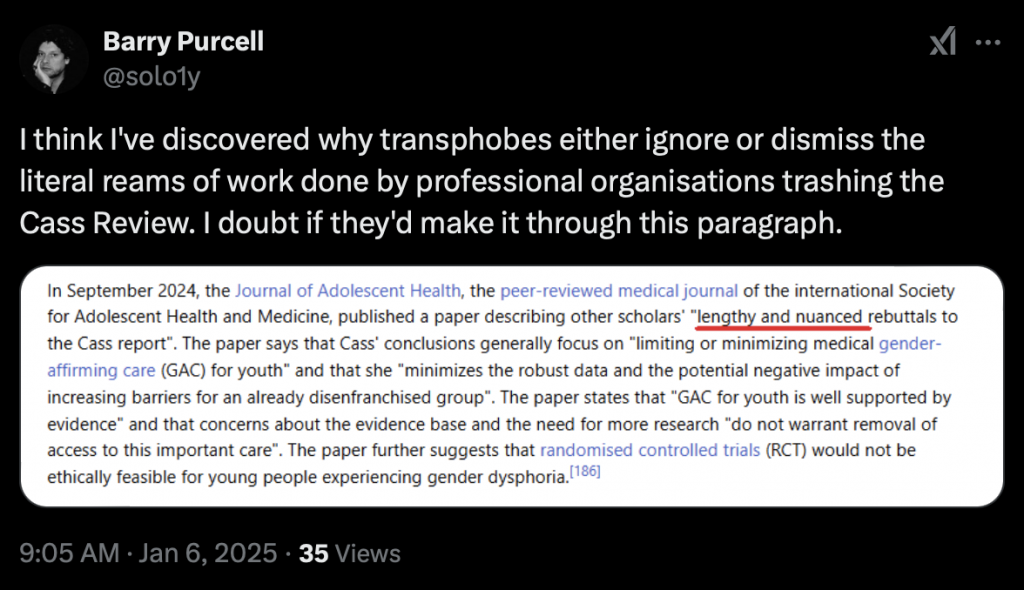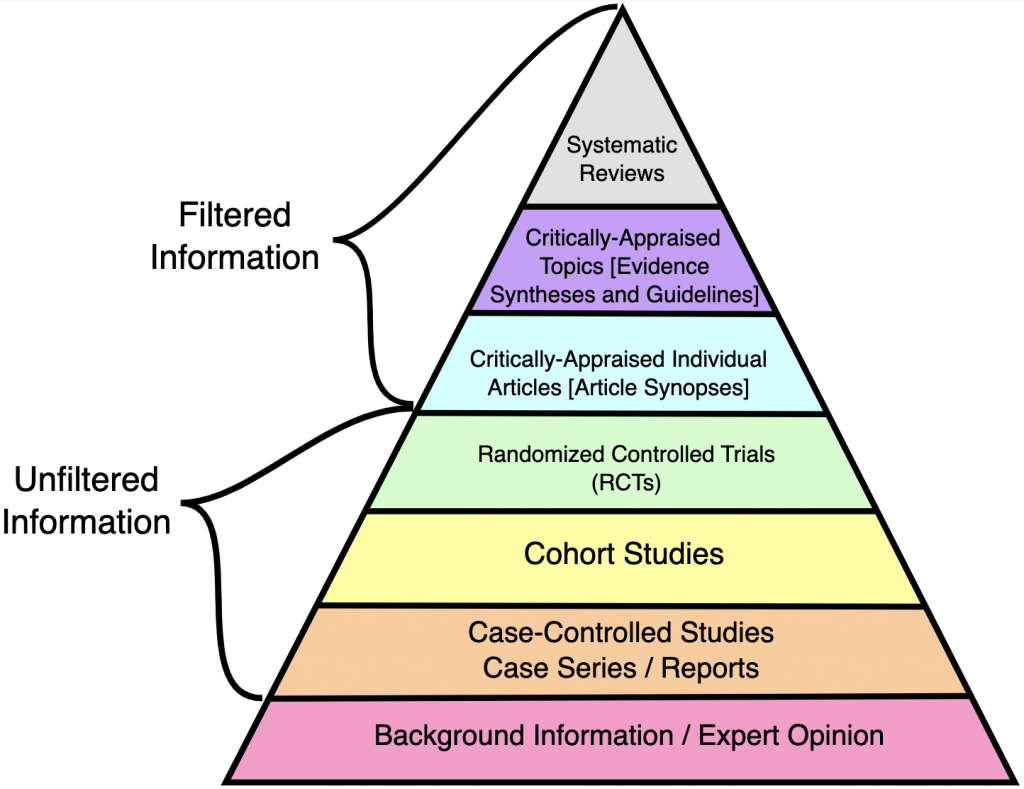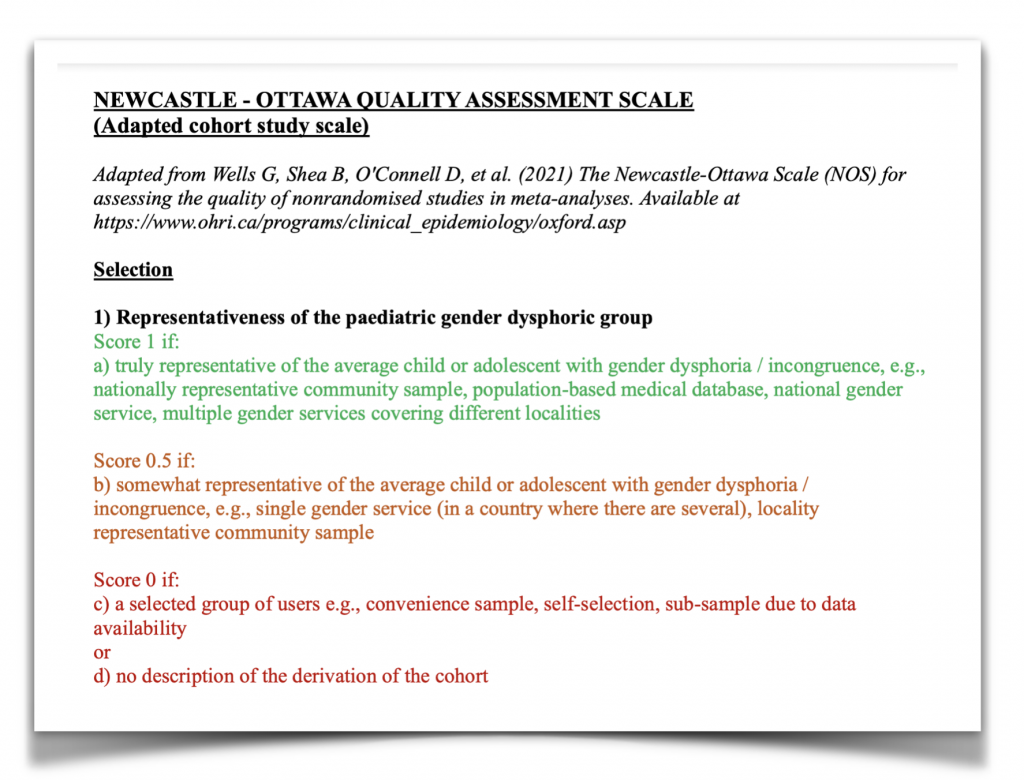I have been informed several times recently that I should be embarrassed to refer to The Cass Report. Among some groups of people it has become accepted wisdom that this is an outlier document, which has been dismissed as unreliable by the most qualified authorities. For example, in the short video clip below the writer Barry Purcell responds to me referencing The Cass Report, by announcing that “the medical organisations have trashed it”.
In follow up to this comment, evidence to support the assertion that The Cass Report has been “trashed by medical organisations” was offered in the form of a paragraph screen grabbed from Wikipedia.

There are a number of problems with this attempt to support the original assertion. Firstly, in order to find a critical comment about The Cass Report on that Wikipedia page, it was necessary to scroll through positive commentary on the report from a list of medical organisations that included:
- the British Psychological Society
- the Royal College of Psychiatrists
- the Royal College of Paediatrics and Child Health
- the Royal College of General Practitioners
- the Academy of Media Royal Colleges
It seems that blanket statements about medical organisations “trashing” The Cass Report are selectively incomplete at best. Moreover, while admonishing others that they’d be unable to “make it through” the quoted paragraph, Barry Purcell appears not to have himself made any further progress down the page, where some responses from Dr Cass herself to the quoted criticism are provided.
Instead of merely restating the views that are acceptable to Wikipedia editors though, it is trivially easy to evaluate the relevant claims independently. The specific problem described with The Cass Report is that it “minimises the robust data” demonstrating that “gender affirming care for youth is supported by evidence”. This does indeed contrast with the view of Dr Cass, who described the evidence for such medical interventions as “remarkably weak”.
So how can we decide whether the available evidence for gender affirming care is robust or otherwise? When evaluating medical evidence, the “level of evidence pyramid” is a commonly used tool. Systematic reviews are widely considered to be the gold standard, whereby a meta-analysis is performed across all available relevant research.

So far, there have been three systematic reviews performed into gender affirming care. These have been in the UK, in Finland and in Sweden. All three have found that the evidence for gender affirming care is weak, and all three have resulted in a ban on puberty blockers. Perhaps Barry Purcell and his team of Cass-critics will also conclude the same thing about the clinical experts in Finland and Sweden (hardly the most regressive countries in the world) as they have already concluded about Dr Cass? The verdict of this team on Dr Cass can be quoted as follows:
“The Cass Report is just some lady who wants to be a bigot, or at the very least doesn’t want to do real research because that would require work and time and patience and effort and talking to people who are different.”
Anyone who had actually read The Cass Report would know that over several years of the review process, Dr Cass did indeed meet with many trans people, with trans advocacy groups and with clinicians who manage trans patients. She also commissioned new qualitative research that involved formal interviews with many trans people. Moreover, Dr Cass has also been fully transparent in terms of describing which research was deemed to be of a useful quality and how that decision was made. She commissioned the University of York to carry out the systemic review, and the experts there evaluated all of the existing research using the best practice Newcastle-Ottowa Quality Assessment Scale. This adapted scale is summarised as follows:

If Barry Purcell believes that the research clinicians in this case have erred in using this particular scale to distinguish “robust data” from less reliable results, I believe he has yet to indicate which would be the correct approach. For example, the reference in red above to the “self-selection” of samples as a problematic approach, could usefully be applied to this very widely cited study. The paper is titled “Pubertal Suppression for Transgender Youth and Risk of Suicidal Ideation”. When activists wish to claim that puberty blockers are necessary to reduce the risk of suicide among “trans children”, this is very often the primary research cited. Is this the “robust data” that Barry Purcell has in mind?
The sample of patients used for this research was taken from the US Transgender Survey. This is a data set that was composed by an activist group called the National Center for Trans Equality, which offered cash prizes for online survey participation. It is a sample of people who have self-reported to be trans patients, which was designed for lobbying by campaigners. It was not designed for medical research. Of course, a sample created through the social media channels of a trans activist group is going to heavily skew towards those more likely to be engaged with that organisation and sympathetic to its goals. In contrast, those who have found their experience of gender affirming care to be negative and who have disengaged with such activist groups as a result, will not be part the self-selected sample. There are other reasons to be skeptical about this self-reported data set, created by a self-selected sample. For example, a very large majority of respondents stated that they started puberty blockers when they were more than 18 years old. People will generally have already completed puberty by this age, and would therefore not be prescribed puberty blockers.
When trying to determine whether or not there is good evidence for the efficacy of giving very consequential drugs to young children, these are the kinds of considerations that The Cass Report took into account. The professional research clinicians looking at the efficacy of treatment across the relevant cohorts of patients, determined that there was no good evidence supporting the prescription of these drugs. They have shown their work in a fully transparent manner, and described exactly the criteria they used to distinguish “robust data” from less useful studies.
Perhaps it is now time for Barry Purcell to show his work? He is not only someone who claims there is “robust data” supporting his positions; he is also someone who is keen to promote the idea that a lack of access to puberty blockers causes suicide. As an aside, Professor Louis Appleby who leads the UK National Suicide Prevention Strategy, has said that it is “dangerous” to use language about suicide in this way. It is perfectly obvious how unsafe it is to create an environment where suicide is described as the inevitable result when puberty blockers are unavailable.

The relevant experts in the UK, in Finland and in Sweden could not find the “robust data” that has convinced Barry Purcell. He reports that Dr Cass has minimised extant robust data demonstrating that “gender affirming care is well supported by evidence”. Where is this data then? Which is the study that Dr Cass dismissed as poor quality, which is in fact robust? If it is only “transphobes” who will “dismiss the literal reams of work” that has “trashed” The Cass Report, then Barry Purcell will very easily be able to cite the research data set that has been improperly overlooked by Dr Cass.
Unless of course, this is only about reciting far-left student union slogans, and throwing insults at eminent clinicians who have spent an entire career helping vulnerable children. In that case, Barry Purcell is doing an absolutely fantastic job.
One response to “Has The Cass Report Been “Trashed” By The Medical Research Community?”
[…] I wrote a short article about the repeated statements made to me by Barry Purcell and his colleagues, claiming that The Cass Report has been “trashed” by the medical […]